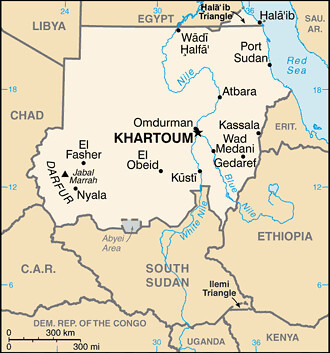
Sudan area where flooding has displaced hundreds of thousands. Over three dozen have been reported killed in the disaster., a photo by Pan-African News Wire File Photos on Flickr.
SUNDAY 11 AUGUST 2013
Sudan says eight family members killed in heavy rains, Khartoum state calls in Swiss experts
August 10, 2013 (KHARTOUM) – Ten people were killed including eight family members as a result of the heavy rains in Sudan’s twin capital of Omdurman and thousands of homes were damaged, according to local officials.
"More than 10 people were killed at Ombadda locality due to heavy rain that lasted for more than eight hours, while over 3,000 houses have been damaged, completely or partially", Omdurman’s Ombadda locality said in a statement.
The locality also warned of more floods headed from high-level areas west of Omdurman and urged the citizens to remain cautious. It called upon philanthropists and civil society organisations to provide support for the affected population.
The executive director of Ombadda locality Ahmed Osman Hamza announced that a 24-hour emergency room was set up alongside another main one which oversees the administrative units that is constantly feeding reports to Khartoum state government.
Hamza said that efforts are underway to evaluate the damage caused by the heavy rains and floods adding that humanitarian aid including food, clothing and shelter were dispatched on Saturday to the western suburb of Ombadda.
He told the official news agency (SUNA) that a bridge will be built soon to protect the western suburb from floods adding that several projects including water harvest schemes, dams and water reservoirs will be launched by the Ministry of Urban Planning and the Ministry of Water Resources and Electricity.
The head of the main emergency room in Ombadda Al-Hassan Khalid stressed that the room is comprised of health officers, administrative officers and heavy machinery drivers who track the performance of the 10 administrative teams.
Khalid confirmed that 10 people in the locality were killed including 8 from one household and a 9-year-old girl, as well as a student in a Khalwa (Quranic School) who is suspected to have drowned but his body is still missing.
The Sudanese Red Crescent Society and the Commission for Voluntary and Humanitarian Work estimated that 98,500 people have been affected by heavy rain and flash floods in Khartoum, River Nile, Blue Nile, North Darfur, South Darfur, Northern and Red Sea states between 1 and 4 August.
The states in Sudan that were most affected included Khartoum (56,000), River Nile (33,000), West Kordofan (12,000), North Darfur (8,000), Blue Nile (6,000), Red Sea (3,000), Northern (1,000) and South Darfur (1,000).
Drainage is poor in the capital of Sudan, where even a little rain can cause flooding, but this year’s water surge was unusually severe.
Young Sudanese have started an online fundraising campaign called Al-Nafeer, Arabic for ’rushing to work’, to provide aid for those affected through a large network of volunteers.
Many ordinary citizens voiced rage over poor preparations by the government and inadequate response to the floods.
SWISS EXPERTS RUSHED TO KHARTOUM
Meanwhile the media office of Khartoum’s state governor Abdel Rahman Al-Khidir announced that a team from a Swiss consultancy firm have arrived in the country on Friday to propose recommendations on addressing the issue of preventing and dealing with floods.
The team started its work on Saturday jointly with a Sudanese team comprised of Khartoum’s survey department, military survey corporation, Khartoum Roads and Bridges Authority and Al-Miraaj company.
The Swiss experts conducted an aerial survey of areas swept by floods in East Nile locality and flood source areas on the borders with the eastern states, collecting useful information from the elderly people with knowledge of the geography of the area.
The head of the team and head of Khartoum survey department, Mohamed Musa Salih, pointed out that the Swiss team has filmed the topography of the area using specific coordinates which will be applied to aerial photographs.
He went on to say that the team will analyse the aerial photographs to determine the flood sources and find a radical solution for the floods problem, adding that residential compounds will be removed from the floodplain.
Salih said that Khartoum state will also develop a plan based on the Swiss team’s findings to build several dams to harvest rain and flood water in order to use it for agriculture, cattle herding and raising groundwater levels.
(ST)
No comments:
Post a Comment